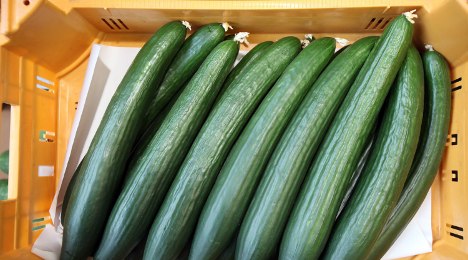More people die every day in car accidents than are likely to perish from the current E. coli outbreak. Yet we know every time we get behind the wheel of a car that we are taking a small risk. We don’t, on the other hand, expect to die from eating a cucumber.
The human psychology of any food scare is at once irrational and quite understandable. Plenty of people point to the reassuring statistics, but are any of them eating Spanish cucumbers this week after three such vegetables from the southern nation were identified as sources of the bacteria?
As the death toll of the E. coli contamination rose to five this week, and 60 new people fell ill on Friday, the German media tended to gravitate to one or the other corner: either the whole episode was overwrought hysterics or a grim reminder that food scandals were part of modern life with its hi-tech farming and long-distance food imports.
The left-wing Berliner Zeitung was the strongest proponent of the latter case, arguing that 21st-century consumers were so geographically and psychologically disconnected from their food production that they had only themselves to blame.
“We no longer eat food that arrives from the fields outside the city onto our table. We eat what is on the shelf in front of us. The grocery chains spare no effort to be able to offer us this convenience. No road is too far and no farming method too absurd. The fact that it’s worth it for cucumbers to come from Andalusia to Lower Saxony is ultimately because of us, the customers.
“We couldn’t care less where the cucumbers on the shelf come from, how they are grown, produced and who gets paid what for them. That the number of feed and grocery transport continues to climb, that they ruin the climate – we also don’t care.
“Meanwhile, we are presented with the bill every few months when a new food scandal arises as the result of the insanity. Until next time.”
The regional daily Rheinische Post took a similar line but focussed less on dreaming of a return to simpler production and consumption and more on the need for more inspections and regulation. Noting that organic as well as conventionally farmed products seemed to be affected, it concluded that “there is only one way to protect consumers from unhealthy food: checks, checks and more checks.”
Germany had barely got over the egg dioxin scandal and now, once again, the biggest losers were the farmers, the paper wrote. It praised the advice of the Robert Koch Institute but urged authorities to keep their recommendations as cautious and up-to-date as possible to protect farmers.
At the other end of the spectrum, the right-wing Berliner Morgenpost pointed out that swine flu resulted in a much higher death toll than that caused so far by E. coli. And swine flu, ultimately, was seen as media hype.
“If that was hype, what will we say in hindsight about E. coli in a few weeks’ time?” it asked.
Even the small risk posed by the bacteria could be avoided by taking sensible hygiene precautions. And if a person does get sick, they can see their doctor right away.
Bavarian paper Nordbayerischer Kurier bested all competitors in the press – if the only criterion was German triumphalism over the Mediterranean. The regional Bavarian paper cast the cucumber contamination as just the latest in a long list of woes for Spain.
“Poor Spain: the economy is at rock bottom, the state is on the verge of collapse, youth rebellion over the lack of job prospects – and now the cucumbers. One of the prime Iberian exports is apparently making people in Germany sick and even costing human lives. Even if not all the infection trails can be followed, the clues lead over the Pyrenees to a sick land.”
Treading a careful middle ground, the Neue Osnabrücker Zeitung feared that excessive precautionary measures would needlessly harm vegetable growers. Of course any bacteria that had killed at least four people and sickened hundreds of others must be taken seriously. Vulnerable groups such as children and pregnant women above all needed to heed the advice of the Robert Koch Institute regarding cucumbers, salad and tomatoes.
But panic and hysteria were undue, the paper wrote.
“Domestic producers in particular must not be put under general suspicion,” it said. The community was “better served by expert knowledge than by creating panic.”
The Local/djw



 Please whitelist us to continue reading.
Please whitelist us to continue reading.
Member comments